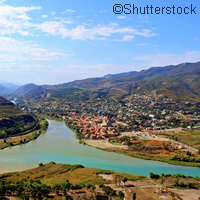Third phase of EU-funded river protection project gets underway in South Caucasus
An EU-funded project that aims to improve water quality in the Kura River basin has just entered its third phase. As part of the project 'Transboundary River Management for the Kura River', funded through the European Commission's European Neighbourhood and Partnership Instrument (ENPI), the EU is helping Armenia, Azerbaijan and Georgia combat pollution and counter the negative impact of industrial and agricultural activities on the Kura. The overall aim of the project is to encourage adoption of the European approach to water management. Running through the Caucasus Mountains from north-eastern Turkey, to Georgia, then to Azerbaijan where it merges with the Aras River and enters the Caspian Sea, the 1,515 kilometre-long Kura River has been dramatically affected by human activities in the region. Water pollution has altered its ecosystem and many fish species have simply disappeared altogether. The whole of Armenia and most of Azerbaijan are drained by the Kura River, although the Kura does not actually pass through Armenia at all. The ENPI project, which has an overall budget of EUR 5.2 million, aims to help these South Caucasus countries adopt a river basin management approach and put together a common approach to water quality monitoring and assessment of the rivers. The river basin management approach is based on EU Water Framework Directive (WFD) methodologies. The project, which started in June 2008, is made up of four parts. The first stage involved comparing the existing systems for water quality assessment in Armenia, Azerbaijan and Georgia with the requirements of the EU WFD. During the second stage, which came to an end in December 2011, a proposal for the replacement of outdated policies and technical instructions was formulated, and a set of technical guidelines were produced to facilitate the adoption of the common approach to water quality assessment. The third part of the project which has just got underway will mainly focus on implementing field surveys in transboundary pilot basins, water sampling and analysis. Following this stage, the fourth and final step will focus on helping improve coordination with EU Water Initiative activities and water projects implemented by the EU and other international agencies in the South Caucasus region. The project is structured around an agreed methodology and an agreed set of rules. Water monitoring teams in Armenia, Azerbaijan and Georgia review and exchange water quality data and carry out joint river monitoring at different locations. These joint monitoring activities have resulted in practical recommendations for introducing quality assurance to improve data accuracy and precision, to adopt similar working procedures leading to comparable surface water quality standards and assessment criteria, and to share water quality information and experience on a regular basis. The ENPI is the main financial mechanism through which assistance is given to European Neighbourhood Policy (ENP) Partner Countries, as well as Russia. It is managed by the Directorate-General EuropeAid Development & Cooperation (DG DEVCO). The WFD commits EU Member States to achieving a good qualitative and quantitative status of all water bodies by 2015. The Directive defines 'surface water status' as the general expression of the status of a body of surface water, determined by the poorer of its ecological status and its chemical status. Therefore, to achieve 'good surface water status' both the ecological status and the chemical status of a surface water body need to be at least 'good'. Ecological status refers to the quality of the structure and functioning of aquatic ecosystems of the surface waters. The WFD acknowledges that water is crucial for all life forms and that securing safe access to it is vital.For more information, please visit:ENPI:http://www.enpi-info.eu/
Countries
Armenia, Azerbaijan, Georgia



